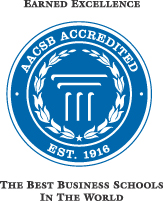Part II: Problems (and how to overcome them)
 Being an accounting major requires aptitude, preparation, dedication and the willingness to work hard. In the first section of the Student Success Guide the issue of professionalism was discussed. This section addresses potential problems commonly encountered by students and how to deal with them.
Being an accounting major requires aptitude, preparation, dedication and the willingness to work hard. In the first section of the Student Success Guide the issue of professionalism was discussed. This section addresses potential problems commonly encountered by students and how to deal with them.
A variety of factors exist that may prevent you from doing as well as you could or should do in your courses and may sabotage your plans for a brilliant college career. You can control some of these factors, others you cannot. For some of them help can be obtained at the University, others you must address yourself. Before you can help yourself or receive help, you need to be able to identify these factors. This guide provides suggestions on how to address these problems. However, in some cases you may need more structured and/or professional help. A variety of resources are available at CSUN, they are briefly introduced and discussed in the final section, the Resource Guide.
Poor Preparation or Missing Prerequisites: Sometimes course work is unduly difficult, not because of a basic lack of aptitude for the subject, but because one is not properly prepared. For example, you may have a difficult time writing or speaking in English. Your introductory accounting course was a long time ago and you have forgotten almost everything. You had a rotten MIS course and you don’t like computers a whole lot anyway. These are problems that can be cured. You may be able to help yourself (reread an introductory accounting book to refresh your memory) or you may have to take a remedial English course. Do it immediately! Without proper preparation you cannot expect to succeed. If you plunge ahead and take courses for which you are ill prepared you will not only be frustrated, but you may ruin your chances of getting a good job! If you are unsure how to remedy a particular deficiency, ask for help. In some instances the University Learning Resource Center (LRC) may be the appropriate source of help, or your instructor may be able to suggest certain things you may be able to do.
Lack of organization and/or failure to obtain critical information: A common complaint heard by professors and administrators is "I didn’t know there was a prerequisite for that course" or I forgot that I had to apply for ....", followed by the demand to "fix" the problem. Unfortunately, by then it is usually too late. Keep in mind, however loathsome we find bureaucracy, in the short term you can only do one of two things: Start a revolution or master its intricacies. Revolutions are messy and tend to result in the replacement of one set of bureaucratic rules by another. Therefore, the short term winning strategy is to determine the rules and requirements in plenty of time. Information is power! This is your responsibility. The information regarding rules, requirements and deadlines is available (reading the catalog and current schedule of classes is a good start). A good rule of thumb is to plan a year in advance. This gives you sufficient time to find out what needs to be done, to correct any deficiencies, get documents, and apply (for whatever) in enough time to ensure that you achieve your goal. (See also the section on developing a course schedule)

Listening to the Wrong People: A famous cold war maxim, attributed to a former governor of California, is "trust but verify". Remembering and applying this maxim can save you a lot of trouble. Students often obtain critical information (what classes to take, which instructor to select, etc.) from their friends. Be very careful if your major sources of information are other students! Consider your source and verify the information received before you act on it. When it comes to requirements, prerequisites and deadlines, keep in mind that the catalog rules. The advice you receive from your friends may be incorrect simply because rules have changed. If you miss a deadline because you erroneously relied on your friend’s advice, you are out of luck! If a friend advises you to take (not take) a certain course or instructor, make sure you find out why! Your friend’s aptitudes and/or goals may be quite different from yours. When you are trying to decide between instructors try to find out more than whether the professor is "easy". Remember, your goal is to become a successful accountant: find out how much other students have learned from an instructor. This, presumably, is why you are at the University, not "to get your ticket punched".
Listening to the Right People: Join the Accounting Association (AA) and/or Beta Alpha Psi ( BAY). AA is open to all accounting students, to join BAY you must meet certain qualifications. The students in these groups are committed to becoming professional accountants. Membership in these groups exposes you to representatives of accounting firms, industry and government agencies who not only are prospective employers, but also provide insight in how accounting "really works". Being involved in AA and BAY helps to prepare you for the real world and may be critical to getting that good job.
Poor Learning or Test Taking Skills, Test Anxiety: These are common problems (much more common than most people think) and help can be found. The Learning Resource Center provides sessions dealing with the most common of these problems:
Note- taking skills: Do your notes consist of doodles? Do you try to write down everything the professor says? Are all pages in your textbook yellow because you highlight everything? Do you find that reviewing your notes does not seem to prepare you for tests? If you answer yes to any of these questions, chances are that a course in note taking might be helpful. You might also ask to look at the notes and/or the textbook of a person who is doing very well. Compare them with your notes (textbook) on the same class. Try to identify the differences between the two sets of notes or books.
Study habits: A variety of study approaches exist. Some are more successful than others. For example, you may try to read a difficult chapter between classes in the cafeteria. Chances are, you will not learn very much, unless you are able to completely tune out what is going on around you and not let yourself be interrupted. Most of us are not able to do that. Instead, use this "down time" to work some practice problems. This is something that can be done in shorter, discrete time blocks. To study that difficult chapter, do the following:
Make sure you have a significant block of uninterrupted time. You may want to do this in the library or at home, wherever you are least likely to be interrupted and where the temptation to do something else is minimized. (See also the section on developing a time budget)
Read a section of the material. Close the book. Try to summarize what you have read or prepare an outline of important items. Open the book and check if you captured the gist of the material. If you missed something or got it wrong, go over the material again. Then, if appropriate, work some problems. If you have access to the solution manual, DO NOT OPEN IT. Do the best you can. Now check the solution manual. If your answer does not agree with the manual, make sure you find out why not. Reread the chapter. Consult your notes. Work another, similar problem. It should be easier now.
Many times it helps to think of a course as a set of many little subjects or assignments. Plan your time in small blocks around the "little" areas and, except for the time blocks dedicated to fundamental issues, don’t spend too much time on one area. Don’t get hung up on minor issues. By the end of your study session you will have the positive accomplishment of being able to "check off" a number of subjects. You will also know what questions need to be asked during the next class period.
Studying for an Exam: Preparation for an exam begins on the first day of classes. In other words, to be successful, you must engage in a continuous process of studying. Slacking off, followed by cramming DOES NOT WORK. For one thing, the competition is too strong. Assuming you have been diligently keeping up with your work, begin your preparation for a test by reviewing your notes several days before the test. Note items the professor has stressed and items that were either not covered at all or declared to be of lesser importance. Concentrate on items the professor considered important. Chances are, they will be on the exam. Review your notes and the chapter outlines or summaries you prepared. Skim through the chapters that will be covered on the exam. Focus on those items that were declared to be important and if you have forgotten anything or if you are unsure, read the relevant sections in depth. Work some comprehensive, difficult problems. If you find them easy, congratulations, you are ready. If you have difficulties with these problems, go back to the text and your notes. Work some easier problems, now try the harder ones again.
Budget your time carefully. Never study at the last minute. You must give your mind some time to absorb the material. If you try to cram at the last minute (anytime after nine or ten o’clock the evening before an exam) you will simply become more befuddled. Make sure you have enough time before the exam to become relaxed. Do not let yourself be trapped in last minute, hysterical sessions with your class mates. Instead go for a walk. Play some pinball or a video game, talk to friends who have different classes, whatever is enjoyable. Of course, the above only applies if you diligently studied at the appropriate time (earlier!!!). If you didn’t, you are on your own. Good Luck ! You’ll need it!
Exam Taking Skills: This is another skill that can be learned. Following are a few suggestions. Make sure you are as comfortable as possible. If you are sitting next to someone who bothers you (gum chewing, noisy calculator, beeper, whatever), if at all possible move. At the beginning of the exam, quickly scan the exam to determine what is on it and where the emphasis is. Perform a sort of mental triage. Easy problems - do those first. Problems that you think you may be able to do if you think about it - do those next. Problems that you could swear came from another course - leave them to last. One of the worst things you can do is try to work a problem that you don’t understand first: You will get more and more bogged down and frustrated. Chances are you will not only fail to solve that problem, but you may run out of time or become so confused, that you will fail to do well on the problems that actually are quite easy for you. Budget your time appropriately. If a problem is worth only five points, do not spend a half hour on it (unless you have done everything else already). The most brilliant answer you give to a five point problem, no matter how much time you spend on it, will still be worth only five points. Don’t leave a page blank. Even if you can’t remember anything about a particular problem, give it a shot (after you have done everything else). Maybe your subconscious does know how to solve the problem. Go for partial credit! The worst that can happen is that you will receive little or few points. but, if you do not even try, a zero score is guaranteed. It does not help when you tell the instructor "I could have done that, but I thought you wanted more" or " I ran out of time".
Test Anxiety: This is a fairly common problem, particularly for diligent students who have high expectations for themselves. If you suffer from test anxiety, please be aware that the Counseling Center may be able to help you. The following suggestions may also be helpful (Note, if you are unprepared for the test you are not suffering from test anxiety; you have every reason to be afraid and the following section will not help you.)
- Make sure you are well prepared and relaxed before the test.
- Keep things in perspective: Remind yourself that even if you fail to do well on one test, it is not the end of the world. Visualize the worst thing that could result from failing one test. Is it as bad as having the driveshaft fall off your car in the middle of rush hour on the San Diego freeway, just as a drive-by shooting is in progress? As bad as the love of your life telling you that he/she has finally saved up enough money for that sex change operation? See, there are worse things than blowing one test. Of course, if you have been failing all tests, perhaps it is time to refer to the section below on having selected the wrong major.
- If you find that you are going into "panic mode" during the test, don’t fight it. It will just get worse. Instead take a few minutes and try to ride it out. Talk to yourself, as if you are calming down another person. You may be surprised, it works. Particularly, if you have a pretty good record, ask yourself " when is the last time I flunked a course? A test? What is the worst grade I have received so far? And how often did I get that grade?" If the worst you come up with was a C in Sociology 101; and your cumulative GPA is a 3.7; and you have 115 credits; the likelihood is remote that (a) you will fail the test; or the course; or that failing one test would have a serious effect on your GPA!
- If you can honestly say that you have prepared as well as reasonably possible, tell yourself that you have done the best you can. No one can expect more.
- Make that appointment with the learning resource or counseling center!!!
Wrong major. Sometimes, no matter how hard we try, a particular subject just doesn’t "click". If you realize that you have had to repeat all or most courses in your major to receive barely adequate grades, perhaps the time has come to admit that you might be happier and more successful in a different major. Keep in mind, if you hate it in college, the odds are slim that you will like it on the job. This can be a very difficult decision to make. You may experience pressure from your family to become an accountant and you may not wish to disappoint them. That is commendable. However, you are the one who will have to live with the misery of taking courses for which you are not suited and to look for a job with poor grades in a field you do not like. Worse yet, you may be condemned to work at a job you hate! This is not a pleasing prospect.
Sometimes people are involved in difficult life situations or have emotional or personal problems that interfere with their ability to excel in their course work. You may have experienced a loss in your family or you may be involved in a difficult or destructive relationship. Your family may be demanding (needing) more of you than you can give and still do justice to your courses. If you feel that your personal life is filled with problems that threaten to overwhelm you, get help! In many cases a few visits to the counseling center may make all the difference. The center is staffed by trained, qualified counselors who are in a better position to help you determine how best to deal with your problems than your friends or your instructors. Your discussions with a counselor are confidential and will not be revealed to your professors or fellow students. Also, counselors are people you don’t have to see again. That makes it easier to talk about private issues that you don’t want everyone to know about.
If you suspect or know that you have a learning disability (for example, dyslexia), make sure that you are evaluated and certified by the professionals in the Disabled Student Services (DSS) office. Once you are certified you may be able to receive assistance to help you circumvent the impact of your disability and to enable you to perform up to your potential.
Return to Professionalism ; Go Forward to Resource Guide
Contact Information
Email: heidemarie.lundblad@csun.edu - Notice: I do not read or answer email from unidentified sources.
![]() Department of Accounting Office: Juniper Hall JH3123
Department of Accounting Office: Juniper Hall JH3123
Department Telephone Number: (818) 677-2461

 Success Guide
Success Guide 
